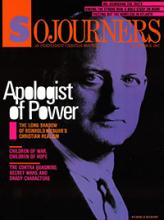Homelessness is absurd. Homelessness is unnecessary. Homelessness is hell. Homelessness is dereliction, frostbitten toes, crooked and lost fingers, burning, bleary eyes with bad vision and a pair of drugstore reading glasses to mask the shame and blindness.
Homelessness is Henry. Henry grew up in North Carolina and 20 years ago came to Atlanta in search of work and his shot at the American Dream. Black, strong, easygoing, Henry now finds himself a resident of nowhere, while a member of the human community that names itself Atlanta. Henry lost job after job as do all unskilled workers in our economy. Henry drinks alcohol to ease his pain and grasp once more at his dream, in the same way others do at a Falcons football game or the Hilton's Sunday brunch.
Henry sleeps under a bridge just off the interstate. Sleep comes only in bits and pieces, so he is exhausted when he gets up at 5 a.m. and stumbles toward the local private enterprise labor pool.
"Will I get work today? Do I want work today?" These questions haunt not only Henry but the 2,000 other men, and some 50 women, who sit in the various downtown labor pools each morning. If a job is offered, most of them must make a choice: to eat or not to eat.
To go out on a job means the worker misses the opportunity for the two meals at the soup kitchens. Stomachs, already groaning from digestive juices sloshing against empty stomach walls, say "Go for the soup kitchen." But a labor pool job, that last glimmer of hope--"maybe today the break will come"--is hard to turn down.
Torn between another day of hunger and a $25 paycheck, Henry chooses food today. So he will not work. At 6 a.m., sitting in a metal chair not far from the greasy hand-written sign "No Sleeping Allowed," Henry falls asleep.
Read the Full Article

